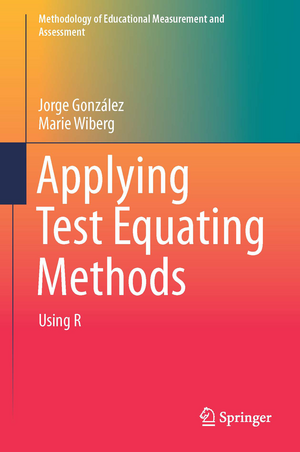Applying Test Equating Methods: Using R: Methodology of Educational Measurement and Assessment
Autor Jorge González, Marie Wibergen Limba Engleză Hardback – 13 mar 2017
| Toate formatele și edițiile | Preț | Express |
|---|---|---|
| Paperback (1) | 776.83 lei 38-45 zile | |
| Springer International Publishing – 18 iul 2018 | 776.83 lei 38-45 zile | |
| Hardback (1) | 793.93 lei 38-45 zile | |
| Springer International Publishing – 13 mar 2017 | 793.93 lei 38-45 zile |
Preț: 793.93 lei
Preț vechi: 1044.63 lei
-24% Nou
Puncte Express: 1191
Preț estimativ în valută:
151.92€ • 162.45$ • 126.67£
151.92€ • 162.45$ • 126.67£
Carte tipărită la comandă
Livrare economică 14-21 aprilie
Preluare comenzi: 021 569.72.76
Specificații
ISBN-13: 9783319518220
ISBN-10: 3319518224
Pagini: 196
Ilustrații: XXVI, 196 p. 33 illus., 13 illus. in color.
Dimensiuni: 155 x 235 mm
Greutate: 0.58 kg
Ediția:1st ed. 2017
Editura: Springer International Publishing
Colecția Springer
Seria Methodology of Educational Measurement and Assessment
Locul publicării:Cham, Switzerland
ISBN-10: 3319518224
Pagini: 196
Ilustrații: XXVI, 196 p. 33 illus., 13 illus. in color.
Dimensiuni: 155 x 235 mm
Greutate: 0.58 kg
Ediția:1st ed. 2017
Editura: Springer International Publishing
Colecția Springer
Seria Methodology of Educational Measurement and Assessment
Locul publicării:Cham, Switzerland
Cuprins
1. General Equating Theory Background.- 2. Preparing Score Distributions.- 3.Traditional Equating Methods.- 4. Kernel Equating.- 5. Item Response Theory Equating.- 6. Local Equating.- 7. Recent Developments in Equating.
Textul de pe ultima copertă
This book describes how to use test equating methods in practice. The non-commercial software R is used throughout the book to illustrate how to perform different equating methods when scores data are collected under different data collection designs, such as equivalent groups design, single group design, counterbalanced design and non equivalent groups with anchor test design. The R packages equate, kequate and SNSequate, among others, are used to practically illustrate the different methods, while simulated and real data sets illustrate how the methods are conducted with the program R. The book covers traditional equating methods including, mean and linear equating, frequency estimation equating and chain equating, as well as modern equating methods such as kernel equating, local equating and combinations of these. It also offers chapters on observed and true score item response theory equating and discusses recent developments within the equating field. More specifically it covers the issue of including covariates within the equating process, the use of different kernels and ways of selecting bandwidths in kernel equating, and the Bayesian nonparametric estimation of equating functions. It also illustrates how to evaluate equating in practice using simulation and different equating specific measures such as the standard error of equating, percent relative error, different that matters and others.
Caracteristici
Discusses how to perform traditional and modern equating methods within R, a platform that has grown in popularity over the last decade and which is freely available from the web Includes the latest innovative equating methods and practical guidelines on how they should be performed Illustrates both the application of several equating methods as well as how to assess them and choose among them













